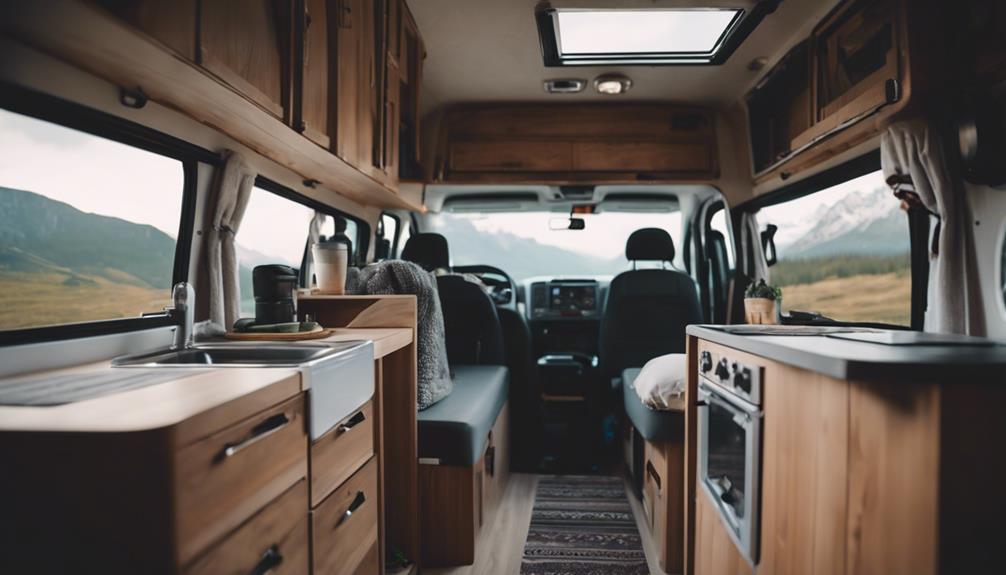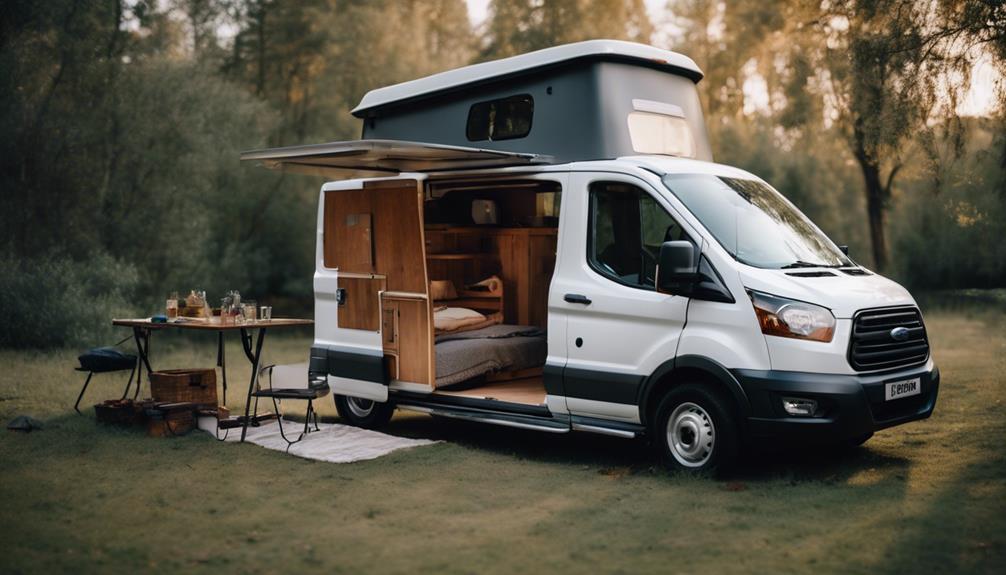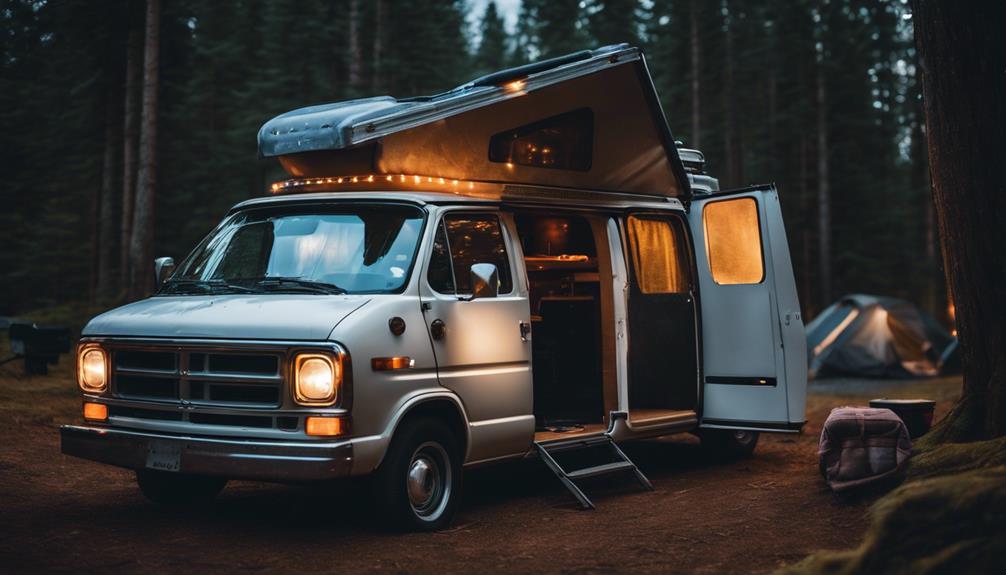When choosing a van for camper conversion, consider options like the Mercedes Sprinter for its durability and spacious interior, or the versatile Ford Transit for its size variety and fuel efficiency. If you're on a budget, the Ram Promaster offers ample space without breaking the bank. For solo travelers, the compact Nissan NV200 is a great, fuel-efficient choice. The iconic Volkswagen Transporter adds retro charm, while the Ford Transit Connect is perfect for quick getaways. Each van presents unique advantages, so explore your options to find the best fit for your adventure needs! You'll discover even more insights ahead.
Introduction
When it comes to camper conversions, choosing the right van can make all the difference in your adventure experience. The Mercedes Sprinter stands out as a top choice thanks to its durability and spacious interior, allowing for extensive customization options that cater to your unique needs.
If you're looking for versatility, the Ford Transit is another popular choice; its variety of sizes and excellent fuel economy make it ideal for camper conversions, ensuring you can find the perfect fit for your lifestyle.
For those on a budget, the Ram Promaster offers a great entry point into the world of camper conversions. Its spacious interior combined with front-wheel drive makes it easier to maneuver in urban settings.
If you're a solo traveler or a couple, consider smaller models like the Nissan NV200 or Ford Transit Connect. While they may limit living space, their compact size and fuel efficiency are hard to beat for quick getaways.
With so many options available, embracing van life can be a thrilling journey, tailored just for you.
Background Information
When you think about camper conversions, it's important to understand their history and how they've evolved over the years.
You'll also want to explore the newer eco-friendly options that are gaining popularity among travelers.
Each choice reflects changing preferences in both lifestyle and sustainability.
Van Conversion History Overview
Camper van conversions have roots in the 1960s, driven by a desire for freedom and adventure among young travelers. The iconic Volkswagen Type 2 bus stood out as the go-to choice, thanks to its compact size, affordability, and spacious interiors. This laid the foundation for the modern van life culture, where hitting the open road became a symbol of liberation.
As time progressed, models like the Mercedes Sprinter and Ford Transit gained popularity in the conversion industry. These vans are known for their reliability, customizable options, and roomy interiors, making them ideal for those looking to create their own unique living spaces. The rise of DIY enthusiasts further fueled this movement, as they shared tips and resources to make camper van conversions accessible to everyone.
Today, the industry has expanded greatly, with specialized companies providing a plethora of kits and components tailored for various needs. Additionally, there's a growing trend toward incorporating eco-friendly materials and sustainable practices, reflecting a shift in values among van lifers.
Emerging Eco-Friendly Van Options
Eco-friendly van options are rapidly emerging, offering environmentally conscious travelers a sustainable way to explore the open road. Models like the Ford E-Transit and Mercedes eSprinter feature electric powertrains, greatly reducing your carbon footprint while enhancing fuel efficiency. With the Ford E-Transit achieving around 126 MPGe, you'll enjoy lower operating costs compared to traditional gas-powered vans.
These eco-friendly camper vans often come equipped with advanced battery systems, providing a range of approximately 100 miles on a single charge with the Mercedes eSprinter, making them ideal for short to medium trips. The increasing popularity of DIY eco-friendly camper conversions allows you to incorporate sustainable materials like bamboo and recycled composites, adding to your environmentally conscious designs.
Moreover, integrating renewable energy sources through solar panel installations can further minimize your environmental impact. By harnessing solar energy for your power needs, you create a more self-sufficient and eco-friendly travel experience.
As you consider options for your camper conversion, these emerging eco-friendly models and practices not only support your adventures but also contribute positively to the planet.
Eco-Friendly Van Innovations
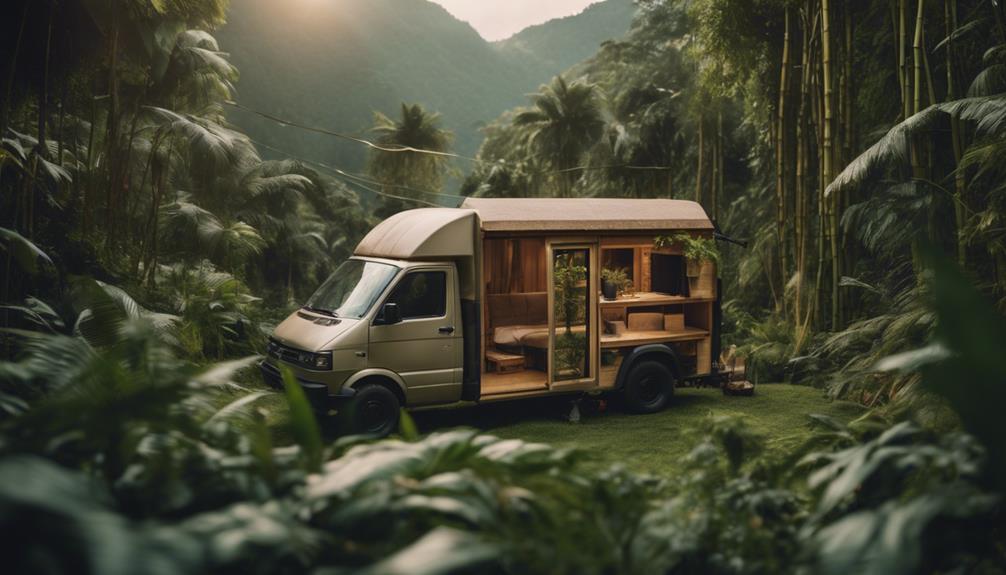
When you're converting a van, consider using sustainable materials like bamboo and recycled plastics to keep your environmental impact low.
Eco-friendly insulation options such as sheep wool and hemp not only regulate temperature but also help reduce your carbon footprint.
Sustainable Materials in Conversions
Sustainable materials are transforming van conversions by reducing environmental impact while enhancing functionality and comfort. When you choose eco-friendly van conversions, you're making decisions that benefit both your lifestyle and the planet.
For cabinetry, consider bamboo; it's durable, stylish, and a renewable resource. When it comes to insulation, look for options like recycled denim insulation or recycled insulation that repurpose waste materials, improving thermal efficiency while keeping your van cozy.
Solar panels are another smart addition, allowing you to harness renewable energy for your appliances and lighting. This reduces your reliance on fossil fuels, aligning your travels with sustainability goals. Enhance your van's interior with biodegradable composite materials that break down easily at the end of their lifecycle, minimizing waste.
Don't forget about finishes; using low-VOC paints greatly improves indoor air quality, making your living space healthier. By incorporating these sustainable materials into your van conversion, you not only create a comfortable living area but also contribute to a greener future.
Eco-Friendly Insulation Materials
Choosing eco-friendly insulation materials can greatly enhance your van's comfort while reducing environmental impact.
For your camper van conversion, consider options like sheep's wool, recycled denim, and cellulose.
Sheep's wool insulation excels in thermal performance and is naturally moisture-wicking, helping to regulate humidity levels in varying climates. This makes it an ideal choice for those who travel across diverse environments.
Recycled denim insulation, made from post-consumer cotton products, not only provides good soundproofing but also offers solid thermal insulation, making it a sustainable choice for your camper.
Additionally, cellulose insulation, derived from recycled paper, boasts a high R-value and is treated with non-toxic fire retardants, which greatly improves energy efficiency.
Cost-Benefit Evaluation
When considering a camper van conversion, you'll want to weigh the advantages and disadvantages of different models.
Industry experts often highlight key features that can impact your decision, such as maintenance costs and resale value.
Advantages and Disadvantages
Evaluating the advantages and disadvantages of popular vans for camper conversion can help you make an informed decision that aligns with your budget and lifestyle needs.
The Mercedes Sprinter offers superior build quality and extensive customization options, but its higher upfront cost and maintenance expenses might deter budget-conscious buyers.
On the other hand, the Ford Transit is a solid choice for those seeking a balance between price and performance. With good fuel efficiency, it starts at a reasonable price, but limited interior height may affect taller individuals' comfort.
If you're looking for the most budget-friendly option, the Ram Promaster shines with its competitive pricing and excellent maneuverability. However, keep in mind that it generally has lower resale value and fuel efficiency compared to its rivals.
When considering the cost of conversion, basic setups can start around $5,000, while luxurious models may exceed $100,000.
Understanding the resale value of each option is essential, as the Sprinter retains value well, while the Promaster depreciates faster.
Balancing these advantages and disadvantages will guide you toward the right camper van conversion for your needs.
Industry Expert Insights
Industry experts emphasize the importance of a thorough cost-benefit evaluation before committing to a camper van conversion project.
When considering popular van models like the Ford Transit, Mercedes Sprinter, or Fiat Ducato, you should analyze both initial purchase price and potential conversion costs. The average base vehicle cost for these vans can range considerably, with the Mercedes Sprinter falling between $20,000 to $27,000 and the Ford Transit from $10,000 to $20,000.
DIY van conversions can save you money, but remember to budget carefully. Total conversion costs typically average around €17,500, with basic conversions starting at approximately €6,236. It's essential to allocate your budget wisely, following the 70/30 or 60/40 rule, ensuring you reserve funds for non-build costs like insurance and road tax while still investing in the build itself.
Efficient use of space is key in your design—think about what features you truly need. Renting a camper van first can also provide valuable insights into your preferences.
Feature Comparison of Models
Understanding the distinct features and costs of various camper van models can help you determine the best fit for your conversion project.
The Mercedes Sprinter is a top contender, starting around $53,400. It boasts a spacious interior and high resale value, making it ideal for serious camper van conversions.
If you're looking for a balance of cost and efficiency, the Ford Transit, priced around $52,000, offers great fuel economy and multiple size options, which can keep maintenance costs lower.
On a tighter budget? The Ram ProMaster is your best bet, starting at approximately $50,000. It provides a roomy interior but may fall short in fuel efficiency compared to the Sprinter and Transit.
For those considering a compact option, the Nissan NV200 is budget-friendly with used prices around $9,000, though its limited space may restrict extensive conversions.
Lastly, the Volkswagen Transporter can exceed $50,000 and is loved for its retro design and customization options, but it mightn't be as budget-friendly as the Ram or Transit.
Evaluate your priorities—spacious interiors, customization options, and budget—to find the camper van that suits your needs best.
Essential Tools for Conversion
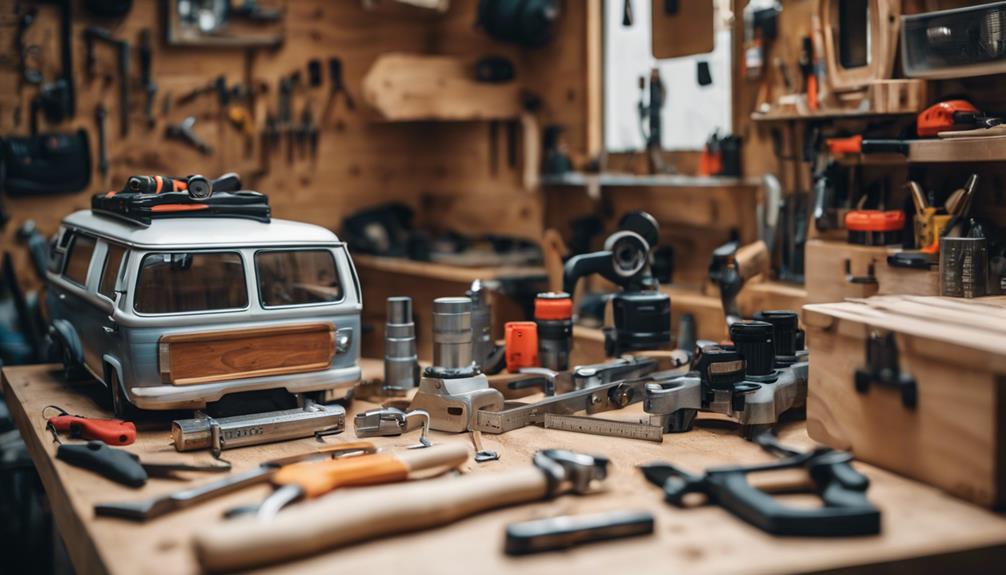
When you're converting a van into a cozy camper, having the right tools is essential for a smooth process.
You'll need essentials like a power drill and measuring tools to tackle various tasks effectively.
Let's explore some recommended tools that can make your conversion project both easier and safer.
Conversion Process Essentials
Equipping yourself with essential tools like a quality circular saw, jigsaw, and drill/driver is key to a successful camper van conversion.
These tools will help you cut wood, create intricate designs, and assemble furniture for your custom van. A multi-tool is also invaluable, enabling you to sand, scrape, and cut in tight spaces, which is especially useful in camper vans like the Ford Transit, Mercedes Sprinter, and Dodge Ram ProMaster.
Measuring tools such as a tape measure and square are vital in the conversion process. They guarantee you get accurate dimensions for your layout, preventing costly mistakes. Additionally, a level is essential for making certain that surfaces are even, particularly when installing cabinets and other fixtures.
Don't forget about safety equipment! Gloves, goggles, and a dust mask protect you while you work.
Conversion Tool Recommendations
Selecting the right tools is fundamental for a successful camper van conversion, guaranteeing your project runs smoothly and efficiently. Start with power tools like a circular saw for cutting wood and a jigsaw for intricate shapes. A drill/driver is also essential for assembling furniture and installing fixtures, giving your van a professional finish.
Measuring tools are key to accuracy. A tape measure and a level will help confirm that everything, from cabinets to beds, is straight and aligned, which is critical for both aesthetics and functionality.
Don't forget basic hand tools like a hammer, screwdrivers, and pliers—they're indispensable for general assembly and quick fixes during your camper conversion.
For electrical work, you'll need specific electrical tools. A multimeter is fundamental for testing your electrical systems and connections, while wire strippers and crimpers help with proper wiring installation.
Finally, prioritize safety equipment like safety glasses, gloves, and ear protection. These items protect you while working with power tools, guaranteeing a safe and efficient conversion process.
Equip yourself well, and you'll be well on your way to a successful camper van transformation!
What Makes These Vans Ideal for Camper Conversions?
When looking for the best vans for camper conversion, consider factors like size, durability, and customizable features. Vans such as the Mercedes-Benz Sprinter, Ford Transit, and Ram ProMaster are popular choices due to their spacious interiors, reliable performance, and potential for unique modifications to create the perfect home on wheels.
What Makes These Vans Ideal Choices for Camper Conversion?
When looking for the best vans for camper conversion, factors like size, comfort, and efficiency matter. Vans like the Mercedes Sprinter, Ford Transit, and Ram ProMaster offer ample space, durable build, and customizable options that make them the best choices for camper conversion projects.
Conclusion
In choosing the right van for your camper conversion, considering your specific needs and budget will lead to a more satisfying and enjoyable travel experience.
The Mercedes Sprinter and Ford Transit are ideal choices for those who value spacious interiors and extensive customization options. They provide reliable foundations for your camper conversions.
If you're looking for a budget-friendly option, the Ram ProMaster offers a cost-effective solution with its front-wheel drive design, enhancing maneuverability for urban settings.
For solo travelers or those who prefer a compact setup, the Nissan NV200 and Ford Transit Connect stand out with their good fuel efficiency and easy handling.
It's important to keep in mind that conversion costs can vary widely, starting from around $7,500 for basic builds and soaring beyond $100,000 for luxurious designs.
To maximize comfort and functionality, invest time in insulating and planning the interior layout of your chosen van.
Ultimately, the right van will depend on your personal preferences and travel aspirations, ensuring that your camper conversion meets your lifestyle needs.
Happy travels!
Frequently Asked Questions
What Vans Are Best for Camper Conversion?
When you're considering vans for camper conversion, look at options like the Mercedes Sprinter for space, Ford Transit for versatility, Ram ProMaster for budget, and Nissan NV200 for compact efficiency. Each offers unique benefits suited to your needs.
What Is the Best Vehicle for a Camper Van Conversion?
When considering the best vehicle for a camper van conversion, you'll want something spacious, durable, and fuel-efficient. Popular options include the Mercedes Sprinter, Ford Transit, and Ram ProMaster, each offering unique advantages for your adventures.
What Is the Most Reliable Used Conversion Van?
When looking for the most reliable used conversion van, consider the Mercedes Sprinter or Ford Transit. Both offer exceptional durability and customization options, ensuring you've got a dependable vehicle for your adventures.
Who Makes the Best Conversion Van?
When you're looking for the best conversion van, consider options like the Mercedes Sprinter or Ford Transit. They offer spacious interiors, customizability, and strong performance, making them top choices for your van life adventures.
Conclusion
In summary, choosing the right van for your camper conversion can make all the difference in your adventure.
With options like the Mercedes Sprinter, Ford Transit, and Ram ProMaster, you've got plenty of ideal choices that cater to various needs and budgets.
Don't forget to take into account eco-friendly innovations and tools that ease the conversion process.
With the right planning and resources, you'll be well on your way to creating a cozy home on wheels.
Happy travels!

